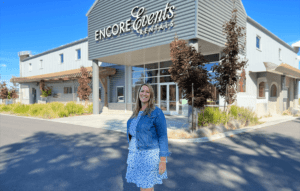Kevin Ebberts is the Founder of RiverNorth Inc., an IT modernization company supporting government agencies, organizations, and programs to access government funding and aid. RiverNorth is based in Ashburn, Virginia and celebrates its fourth anniversary in 2024. In this blog, we discuss the importance of shared values in an organization and using these to create and manage successful teams.
Having clearly defined values is crucial in an organization. They are the guiding principles, the North Star Founders and employees continue to come back to when faced with decision making, establishing processes, procedures, and maintaining a consistent market image. But values are also the building blocks of company culture. They are the common ground between employees. They shape leaders’ decisions when hiring new talent. Additionally, employees are more likely to stay with an organization that aligns with their ethics.
We ask Kevin what RiverNorth’s main principles and values are.
“We’ve got five fundamental assumptions. This is what guides our organization whenever we’re making tough decisions.
“Our first one is that corporate purpose is the sum of each individual’s purpose. This gets to the heart of why we’re building this company and the people we want to be. We don’t have a fifty-year plan where someone gets a nice gold watch at the end.
“We hire very driven and enthusiastic people that we assume are going to want to do something of their own. Whenever we’re thinking of a project, we ask people what their long-term goals are, and then we determine what they can learn while they are with us that will drive them closer to their goal.
“If someone decides to leave the company, we won’t think, ‘You’re dead to us’. Instead, we know that was a relationship we built. When they go somewhere else, we might want to partner on something one day.”
In reality, employees won’t stay in your company forever, especially in the current dynamic work environment. Viewing every person you work with as an addition to your expanding business network, extended team if you will, is much more valuable than trying to ensure someone would stay in your company forever. The latter would inevitably lead to hurt feelings and burnt bridges: a big mistake you can make in the world of business, where every connection has unique value.
What Kevin shares with us next continues the theme of acting in line with everyone’s best interests and wanting to change the status quo.
“Number two is we actively sense opportunities to challenge the current. That’s our tagline. But challenging the current is really about the current status quo, challenging the current approach. We wanted to be innovators and disruptors in our space, which we are. We’re smaller disruptors than some of the Silicon Valley startups, but when we approach an issue, we always update the client on everything that is going on. This is something that is not done in the world of federal contracting.”
The magnitude of the changes doesn’t matter, even small innovations create ripples that organically change over time. Another innovative approach in RiverNorth is their incredibly inclusive company structure.
“One of our assumptions is that every person is critical and valued regardless of role. We’re title-less, we have people that serve a certain role on a project, people that lead our internal roles. But we’re small, a twenty-person company, so we let everyone contribute to areas they’re passionate about. We’ve got an employee who is excited about recruiting: he’s our recruiting lead. We have someone interested in benefits: they are leading assessing benefits, and so on. Everyone contributes regardless of role. We make all our decisions out in the open, not behind closed doors. We want everyone’s input.”
This unique structure allows everyone to feel included and safe to express their opinions. But at the same time, it doesn’t work for all people, it doesn’t work for those who are satisfied with just being employees and following a list of assigned daily tasks. You need to be proactive.
“This approach wouldn’t work everywhere. It requires a very specific personality. You can’t do that while wanting to be someplace you just hide and do the work.
“We came up with the approach because one of the things we wanted to fix is how we felt at companies where there was this toxic trait of wanting to whine. If you take away the blocker and say, ‘You’re fully empowered to come up with a solution’, all of a sudden that toxic whining goes away because you find the responsibility terrifying. Or on the flip side, you get incredible ideas. People become a part of the solution to the problem that they are sensing. We challenge everyone, we say, ‘Sense, challenge, adapt’. We can’t evolve if people aren’t participating in that. That’s one of the things that we really encourage. Small ideas, big ideas, whatever. Help us come up with ideas on how you sense things should change.”
The involvement and shared responsibility go further:
“We trust and are accountable to each other. It’s assuming positive intent, thinking about not just yourself, but your impact of your decisions on the entire organization. If you don’t meet your targets and don’t get your billable hours, then our bonus pull shrinks. That affects everybody. A big piece of that is providing each other with feedback, practicing radical candor, and really understanding that we’re functioning as an organism not just as a machine.
“We have a weekly operations call where we talk about business development, recruiting, investments, and things that we’re trying to do in the company. Everyone is invited to that. We don’t have a behind-closed-door way of management in any respect.”
The last practice rooted in values Kevin shares is incredibly progressive, innovative, and very rare. He’s taken one of his own core values, transparency, integrated it into his business, and taken it to the next level.
“In RiverNorth, everyone shares the burden of transparency and honesty. One of the radical things we did is that all our financial books are completely open to the company. Everyone knows what everyone else makes, everyone can see the profit that’s coming out. They can see where we’re spending our money. They see their rates. They can access contracts. Absolutely everything as long as it’s not legally confidential. So that they’re informed to make suggestions, but also they know what’s happening when things are good. They understand what’s happening when things haven’t been good. Transparency goes both ways.”
Doing things this way further pushes employees to be proactive and motivated, making the last three points complementary. But even with all this level of involvement from everyone in the team, it still takes a lot of hard work as a Founder to get to a place where others can fully take some of the leadership load.
“Hard work takes time, shifting responsibilities to coworkers and training them pays off and is integral for scaling up a business.
“Three years in, I’m seeing other people step up to take some of the leadership roles. We’re seeing that the secret sauce can’t just be the Founder. It’s hard to scale if you have all the knowledge, the specialty, the expertise. You have to get people who want to learn that. Relinquishing some of the control knowing that you can’t touch every single deliverable. Some people are going to step up. It’s going to be a stretch for them and some things might fall, they might not get done as quickly as if you did them yourself, but it is impossible to scale and grow if you are the limiting factor of that growth. The Founders can’t be in everything. Letting go and focusing on training and building out that X Factor into other people allows you to get back to a normal day, or not be on every single project and get to serve strategic roles, or help others grow. So I’m finally doing the thing that I always wanted to do. But it took a while to get here.”
Since Founders bring a lot to their companies, we finish by asking Kevin about the five most important things someone who knows him well knows about him.
“What’s funny is they’re in line with a lot of our company values. I’m honest, direct, and transparent. I build relationships for the sake of the relationships and not just because I need something. I’m a strong proponent of balancing effort and outcome to avoid that sort of law of diminishing returns. So efficient and productive but also I emphasize on high quality. There’s nothing I value more than time. I cannot stand wasting it, not even a little bit.I move fast and I get real antsy when things are inefficient, stalled, or decisions aren’t being made. I think the folks that I work with attest that I’m fair, but I usually say, ‘We’ve been talking about this for too long. We’ve done nothing. Let’s just pick something up.”
Everything good takes time and hard work, but it does pay off. While it can be challenging, the rewards at the end are worth it. But you don’t have to walk the walk by yourself. You can join our welcoming and growing community at Follow the Founder. You can also find us on Instagram or LinkedIn.
Want to Keep Reading?
Who Not How: Dan Sullivan
Entrepreneurial coach shows you how to make a mindset shift that opens the door to explosive growth and limitless possibility–in your business and your life.































